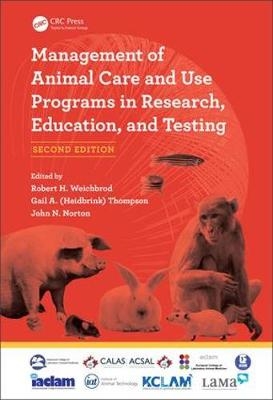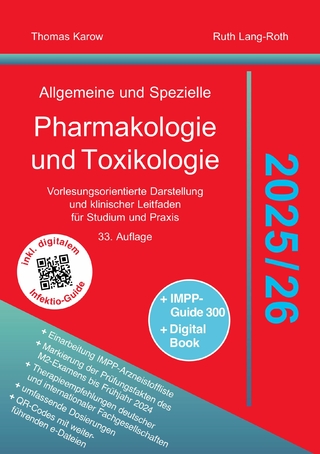
Management of Animal Care and Use Programs in Research, Education, and Testing
Crc Press Inc (Verlag)
978-1-4987-4844-5 (ISBN)
- Titel z.Zt. nicht lieferbar
- Versandkostenfrei
- Auch auf Rechnung
- Artikel merken
Management of Animal Care and Use Programs in Research, Education, and Testing, Second Edition is the extensively expanded revision of the popular Management of Laboratory Animal Care and Use Programs book published earlier this century. Following in the footsteps of the first edition, this revision serves as a first line management resource, providing for strong advocacy for advancing quality animal welfare and science worldwide, and continues as a valuable seminal reference for those engaged in all types of programs involving animal care and use.
The new edition has more than doubled the number of chapters in the original volume to present a more comprehensive overview of the current breadth and depth of the field with applicability to an international audience. Readers are provided with the latest information and resource and reference material from authors who are noted experts in their field. The book:
- Emphasizes the importance of developing a collaborative culture of care within an animal care and use program and provides information about how behavioral management through animal training can play an integral role in a veterinary health program
- Provides a new section on Environment and Housing, containing chapters that focus on management considerations of housing and enrichment delineated by species
- Expands coverage of regulatory oversight and compliance, assessment, and assurance issues and processes, including a greater discussion of globalization and harmonizing cultural and regulatory issues
- Includes more in-depth treatment throughout the book of critical topics in program management, physical plant, animal health, and husbandry.
Biomedical research using animals requires administrators and managers who are knowledgeable and highly skilled. They must adapt to the complexity of rapidly-changing technologies, balance research goals with a thorough understanding of regulatory requirements and guidelines, and know how to work with a multi-generational, multi-cultural workforce. This book is the ideal resource for these professionals. It also serves as an indispensable resource text for certification exams and credentialing boards for a multitude of professional societies
Co-publishers on the second edition are: ACLAM (American College of Laboratory Animal Medicine); ECLAM (European College of Laboratory Animal Medicine); IACLAM (International Colleges of Laboratory Animal Medicine); JCLAM (Japanese College of Laboratory Animal Medicine); KCLAM (Korean College of Laboratory Animal Medicine); CALAS (Canadian Association of Laboratory Animal Medicine); LAMA (Laboratory Animal Management Association); and IAT (Institute of Animal Technology).
Robert H. Weichbrod is the chief animal program administrator with the National Eye Institute of the National Institutes of Health in Bethesda, Maryland. Before this position, Dr. Weichbrod was responsible for managing laboratory animal resources for the U.S. Department of Defense’s Uniformed Services University of the Health Sciences. Dr. Weichbrod received his bachelor of science in zoology from the University of Maryland, master of business administration from Marymount University, and doctor of philosophy in public administration and policy from Walden University. His dissertation, providing an analysis of the care and use of laboratory animals in Department of Defense activities, is a seminal work that has been frequently cited during congressional hearings. Dr. Weichbrod earned his laboratory animal technologist certification from the American Association for Laboratory Animal Science (AALAS) and was a charter class graduate of AALAS’s Institute for Laboratory Animal Management. Dr. Weichbrod’s distinguished career in animal care and use spans over 35 years. He has worked in positions ranging from an entry-level animal care technician (age 24) to animal program administrator. Dr. Weichbrod has served in a wide variety of leadership roles during his career, including AALAS president in 2000, member of the American Association for Accreditation of Laboratory Animal Care (AAALAC) International’s Council on Accreditation from 1997 to 2009, on its board of trustees from 2010 to 2016, and currently as a member organization delegate for AAALAC International. Dr. Weichbrod has served as a vice president for the Institute of Animal Technology in England since 2002. Among Dr. Weichbrod’s awards are AALAS’s Joseph J. Garvey Award and George R. Collins Award; LAMA’s William O. Umiker Memorial Award, U. Kristina Stephens Award, and Charles River Medallion; the Purina LabDiet Animal Technician of the Year Award; and the Award of Excellence from the U.S. Secretary of Defense. Gail A. (Heidbrink) Thompson has been active in the laboratory animal science community since beginning her career at the University of Minnesota in 1966. She has held research positions at the University of Minnesota, at Emory University/Yerkes Regional Research Primate Center, and as director of animal resources at National Jewish Health in Denver, Colorado. She was a principal and cofounder of Britz-Heidbrink, Inc. (a manufacturing company for animal research facilities and zoological parks). She was the founder, owner, and president of Peak Animal Resources+, Inc. until her retirement in December 2014. Along with her long career in laboratory animal science and zoological park facilities, Gail has been a dedicated volunteer in several associations that strive for the humane care of laboratory and captive animals through facility and housing improvement, education and training, and oversight and management. The associations include but are not limited to AAALAC International, trustee (2000–2016), delegate and board of directors (current); the American Association for Laboratory Animal Science (AALAS) since 1973; the Laboratory Animal Management Association (LAMA), formed in 1983, founding member; the Institute of Animal Technology United Kingdom since 1989; and the Mile High Branch of AALAS since 1977, founding member. Additional organizations in which she has participated include the American Society of Primatologists, Canadian Association for Laboratory Animal Science, Scientists Center for Animal Welfare, Scandinavian Society for Laboratory Animal Science, International Conference on Environmental Enrichment, Association of Zoos and Aquariums, American Association of Zoo Keepers, and several branches of AALAS. She is a recipient of several awards, including Ralston Purina Animal Technician of the Year, George Collins Award (AALAS), Joseph Garvey Award (AALAS), Ulla Kristina Stephens Award (LAMA), Charles River Medallion, Wm. O. Umiker Award (LAMA), Roland Tibbetts Award (U.S. Small Business Administration), Manufacturing Legacy of the Year (University of Wyoming), and life memberships for AALAS, LAMA, and the Mile High Branch of AALAS. John N. Norton is the director of the Division of Laboratory Animal Resources, is a professor of pathology, and serves as the attending veterinarian for all animal care and use activities at Duke University in Durham, North Carolina. He also serves as an adjunct professor of clinical sciences at North Carolina State University College of Veterinary Medicine. Prior to returning to academia, Dr. Norton served as a toxicologist and directed a laboratory animal resources organization in the private sector. Dr. Norton received his bachelor of science degrees and doctor of veterinary medicine degree from North Carolina State University and his doctor of philosophy in pharmacology from Vanderbilt University. He is board certified through the American College of Laboratory Animal Medicine and the American Board of Toxicology. Dr. Norton’s distinguished career in both toxicology and laboratory animal medicine spans over 25 years. He has managed preclinical discovery and development projects, prepared regulatory dossiers for both domestic and international submissions, designed and managed complex animal facilities, and strived to optimize research outcomes while ensuring regulatory compliance of animal programs. In his roles in drug and biomedical device development, he has served as study director and/or manager in more than 150 preclinical pharmacology and safety studies in both the academic and private sectors. In his current position, he has developed a preclinical core capable of performing a wide variety of discovery and developmental studies, including those requiring performance under good laboratory practice regulations.
Introduction/Historical Overview. Evolution of Laboratory Animal Program Management. Developing a Collaborative Culture of Caring. Organizational Responsibilities. Fostering Collaborative Roles & Responsibilities for Members of IACUCs and Other Oversight Bodies (committees). Bioethics for an Animal Care Program. Behavioral Management through Animal Training. Outreach Programs. Compliance, Assessment and Assurance. Compliance and Regulatory Programs. Globalization and Harmonizing Cultural and Regulatory Issues. Assessment and Accreditation Programs. Facilitating the Research Process: Understanding Performance vs. Engineering Standards and the Impact of Regulatory Burden. Program Management and Stewardship of Resources. Management of Human Resources. Education and Training. Fiscal Management. Occupational Health and Safety. Program Documentation & Monitoring. Utilizing Information Technology. Disaster Planning and Emergency Preparedness. Physical Plant. Facility Design, Planning & Renovation. Security and Communication Systems. Environment and Housing. Environmental Factors: Macro environment vs. Microenvironment. Small Animal Enclosures & Housing. Large Animal Enclosures & Housing. Agricultural Animals.Aquatics. Additional Unique Species. Husbandry. Basic Colony Management. Feed and Bedding. Watering Systems. Breeding. Biosafety & Biocontainment. Animal Health and Care. Veterinary Care. Behavioral Training as Part of the Health Care Program. Isolation, Quarantine and Biocontainment/Biosecurity. Surgery. Euthanasia. Conclusion. Future Directions. The Legal Arena: Impact on programs.
| Erscheinungsdatum | 17.08.2017 |
|---|---|
| Zusatzinfo | 55 Tables, black and white; 37 Illustrations, color; 100 Illustrations, black and white |
| Verlagsort | Bosa Roca |
| Sprache | englisch |
| Maße | 178 x 254 mm |
| Gewicht | 1752 g |
| Themenwelt | Studium ► 2. Studienabschnitt (Klinik) ► Pharmakologie / Toxikologie |
| Naturwissenschaften ► Biologie ► Biochemie | |
| Naturwissenschaften ► Biologie ► Zoologie | |
| Veterinärmedizin | |
| Weitere Fachgebiete ► Land- / Forstwirtschaft / Fischerei | |
| ISBN-10 | 1-4987-4844-9 / 1498748449 |
| ISBN-13 | 978-1-4987-4844-5 / 9781498748445 |
| Zustand | Neuware |
| Haben Sie eine Frage zum Produkt? |
aus dem Bereich


